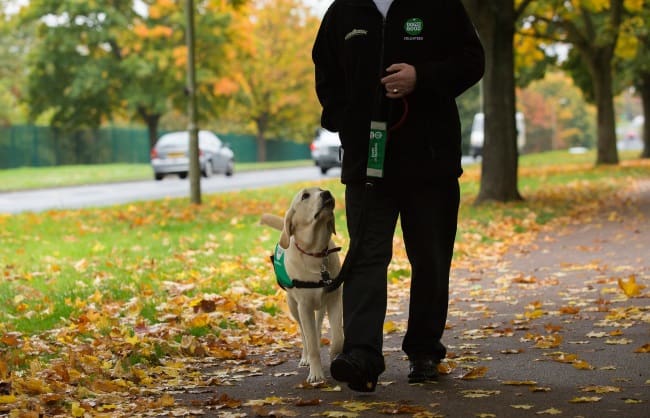
Stephen Jenkinson knows the recipe for the perfect dog walk. As access advisor to the Kennel Club he spends his time advising local councils and government bodies on how to ensure we all have access to good, accessible places to walk our dogs, enjoy the ‘perfect dog walk’ and create healthy opportunities for us and our dogs.
He’s sharing his passion for the subject at our Power of Dogs events, and explains here why to him his job doesn’t really feel like a job at all.
Protecting dog walking
“I never thought a job like that existed,” and “I didn’t realise the Kennel Club protected dog walking,” are two sentences I hear a lot. And it never ceases to amaze me why ensuring there’s quality green spaces around town, coast and country for people to enjoy happy, healthy, hassle-free dog walks would be a “non-job”. Especially as official figures from the Welsh Government – and public bodies all over the world – show that having a dog is one of the top two factors giving people healthy, active lifestyles. Truly, the “Power of Dogs”.
Yet, this “non-job” has been my vocation for the last 16 years and has seen me working across the UK for the Kennel Club and given me the opportunity to help create environments that allow many of us to enjoy the perfect dog walk.
I can understand why people don’t realise such work goes on though, as much of our effective advocacy with government bodies and local councils happens quietly behind the scenes.
Being dog-walking friendly makes political sense too; for a quarter of all UK households (filled with voters), taking the dog for a walk is a fundamental and enjoyable part of daily life. Even assistance dogs need down-time in safe green spaces where they can run and play, as all work and no play is a recipe for poor performance in dogs as well as people.

What is the recipe for the perfect dog walk?
It’s a vital question, because if we get the ingredients right, people will want to walk further and more often; which is good for dogs, good for human health and good for society as a whole.
For such an age-old activity, until recently, we knew little about the science of a walk in the park. But in the last 15 years that’s all changed and there’s now an international network of practitioners and researchers investigating dog walking.
One such colleague is Dr. Catherine Smith from the University of Otago in New Zealand and last year, thanks to her team, we actually found out what the recipe for a perfect dog walk is.
Catherine’s team studied the dog walking activity of 13 dog owners with long-term illnesses, including multiple sclerosis, diabetes, asthma, brain trauma and depression. Each dog walk lasted around 45 minutes and took place on beaches, sports fields, and pavements and included on and off-lead exercise.
Analysis of all the data revealed four key ingredients for walks that were the best for human health:
- A special relationship: A caring and empathetic relationship between the person and the dog was a vital ingredient and something that the dog owners in the study – and many other people with disabilities – did not always get from people.
- Motivation: Having a dog in their lives gave owners the daily desire to be active out of “an obligation of love” towards their pets.
- Connections with others: All but one of the dog owners felt lonely and isolated at times. Having a dog helped break the ice with other people, and fostered upbeat relaxing conversations that were centred on each other’s dogs rather than the owners’ disabilities or illnesses.
- Positive sensations: The natural sights, sounds and smells of the environment where the owners were walking was also key to making dog walking beneficial for human health.

Power of Dogs
Listen to Stephen, Brian Blessed, and other inspiring speakers at our Power of Dogs events in London and Cambridge
Scientific evidence of the benefits of dog walking
This echoes the findings of a 2011 study which found that the North American approach of restricting dog walking activity to often small, unattractive dog parks actually reduces human activity levels.
Of course, all this research is simply proving what we dog lovers have known in our hearts for ever. But at a time when a few irresponsible owners can prompt local councils to impose excessive dog walking restrictions on the many, it’s vital to have such scientific evidence to influence decision-makers.
Thankfully, as the people attending my first Dogs for Good ‘Power of Dogs’ talk in Oxford discovered, there’s also lots of inspiring good practice happening, too. I’d love to tell you more, so why not come along to the London or Cambridge events this Autumn? Book your tickets.
Update: February 2019 – If you would like to be the first to hear about tickets for Power of Dogs talks in 2019, please sign up for our e-newsletter.
